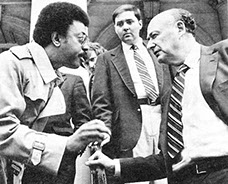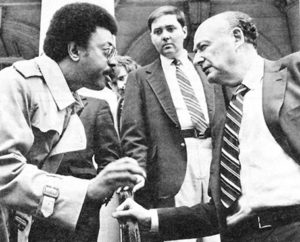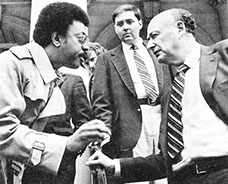
CHARLES ENSLEY EDUCATIONAL FUND (Formerly SSEU Local 371 Educational Fund)
The Charles Ensley Educational Fund was created through the strength of collective bargaining, and has provided benefits to covered members for more than thirty-five years.
The objective of the Trustees of the Charles Ensley Educational Fund has always been to provide the best training and educational benefits possible. The Fund’s benefit program therefore has been modified from time to time in response to changes in the covered members’ educational needs, and in accordance with changes in the financial condition of the Fund.
The program is designed to help covered members of all educational levels defray the cost of additional training and education. The Fund has always provided the maximum benefits possible, and will continue to serve you in this tradition.
Remembering Charles Ensley
Elected in 1982, Ensley was tireless in his efforts to organize members and to expose wider injustices in the City. In 1986, he helped the New York Times cover the overcrowding in the child welfare system that was overburdening SSEU Local 371 members.
Under his leadership, the Union saved several important programs, such as the Community Alternative System Agency and the Division of AIDS Services (on three separate occasions, no less). All the while, he was defending the rights of civil servants and fighting City Hall’s efforts to reduce and outsource services. And he increased the size of the Union from 8,000 members when he took the helm to more than 17,000 when he retired.
Protecting Civil Service
“Protecting the merit and fitness system of civil service and combating patronage and corruption was the hallmark of Charles Ensley’s leadership,” said Larry Glickson, a former Vice President and close advisor, and a current senior advisor to the President, “He was able to make the connection between the workers and the people we serve.”
A native of Birmingham, Alabama, Ensley brought his skills from the civil rights struggle in the South to the municipal labor movement in New York City. Known for never backing down from a fight against a Mayor – whether it was Ed Koch, David Dinkins or Rudy Giuliani – Ensley believed that members should never get less than they deserved. When DC 37 brought home a contract he thought shortchanged social service employees, he led a campaign to vote it down. And when DC 37 found itself the subject of a large criminal investigation, he was proactive in reforming the institution for the better.
Diane Silver, Chair of the Union’s Jewish Heritage Committee, re-called that Ensley’s leadership was key to fighting privatization in homeless services. “I will always be grateful to Ensley for being on the front line to keep these vital services staffed by dedicated civil servants,” she said.
The Union’s Former Executive Vice President, Yolanda Pumarejo, said “He was my mentor and friend. Charles inspired members no matter who they were or where they worked. His honesty and integrity was never compromised. His commitment to the labor movement was immeasurable. His core principle was that the Union was our common ground. and for 26 years Charles led this Union in a member-driven style and afforded me the opportunity to learn and understand the true meaning of leadership and unionism.”
Shirley Gray, former Executive Assistant to the President, recalled, “He trained me as a grievance rep. He taught me everything about being an active union member. He was an outstanding and outspoken example of leadership, and above all, an unforgettable friend.”
Ensley inspired members and leaders of other unions, especially the ones working closely with SSEU Local 371. “Social work is a caring profession, but in City service, it is also very tough,” said Bob Croghan, Chairman of the Organization of Staff Analysts. “A social work union, therefore, must be both caring and tough. Charles made sure that SSEU Local 371 lived up to its reputation.”
Union member Kathleen Sabater recalled how memorable Ensley’s speeches could be, and that she thinks about his words and his charisma whenever she thinks about the challenges Union members are facing today. “You can just hear him say, ‘Stick with your Union.'”
Former VP Linda Schleicher recalled the times Charles would get angry when reading the newspapers about the right-wing attacks on unions. “I know he would ask Union members to be informed and to be proud of the work they do.” She emphasized that he also knew how to have a good time with the members. “He was politically savvy, funny and generous. He loved a good time but he never wavered in his belief in the Union and its members.”
Reggie Styles, the current Executive Assistant to the President, said “Charles always referred to me as the son, and I will always remember him as my Union father.”
Charles Ensley Educational Fund Procedures and Rules
Time Limits For Claims Filing
Any member who has incurred an expense that is covered by a benefit of the Charles Ensley Educational Fund should file a claim timely, so that he/she will be reimbursed quickly.
All claims for educational expenses covered by the benefits of the Fund that were incurred within the current Academic Year (September 1 through August 31) must be filed by August 31 of the next Academic year.
Overpayment/Future Offset
In the event you receive an overpayment, or mistaken payment, by the Charles Ensley Educational Fund, then you are obligated to refund said overpayment to the Educational Fund immediately. In the event you fail to refund said overpayment/mispayment, then the Educational Fund shall have the right to offset any future benefits’ reimbursement due you by that amount, until the affected Fund is fully reimbursed for the amount of the overpayment/mispayment to you.
Procedure For Claims Review
The following is a description of the claims review procedure.
In the event that your claim has been denied in whole or in part, and you do not agree with the denial, you may request in writing a review of the Fund’s decision regarding your claim, within sixty (60) days of your receipt of written notification of the denial of your claim. This request must identify the covered member, the decision to be reviewed, and must also explain the reason you do not agree with the denial of benefits.
You may designate a representative to act on your behalf in the review procedure. To designate a representative, you must provide a written statement specifying the name of the representative, the claim number or denial notice number, and the designation must be notarized, signed and dated. A written designation of a representative is necessary to protect against disclosure of information regarding the claim except to your authorized representative. Upon receipt of the request for review of the claim, you or your authorized representative have the right to submit issues and comments in writing, and any additional information pertinent to the claim.
If your claim is rejected, you will be given an opportunity to request a conference with a committee of the Board of Trustees at a specified time for further review of your claim.
All decisions of the Board of Trustees shall be final and binding on the member, his/her representatives or estate. You must follow the appeal procedure stated above before instituting any judicial proceeding or action.
Benefits For Covered Members
Benefits for the covered member are divided into two major categories: Course Benefits, and Other Educational Benefits. The Fund’s total reimbursement for any one or combination of courses under Course Benefits or Other Educational Benefits is limited to $700 per academic year (September 1 through August 31). You are eligible for benefits if you are a covered member on active pay status at the time of registration and attendance. The attendance requirement is satisfied when you can no longer receive any refund of tuition if you withdraw from the course.
In order to be eligible for coverage, any course, including any Computer Course or Computer Seminar, must be provided by a school that is licensed by the Education Department of the state in which the school is located, or by an accredited junior college, college, or university. The Fund will not cover costs for Computer Courses or Computer Seminars provided by the manufacturer or by a computer vendor.
Courses For Non-High School Graduates
Tuition will be reimbursed to a covered member who has no high school diploma, which is $700 per academic year, for any course (including those of a commercial, vocational or technical nature) that:
Contributes to the member’s achievement of a high school diploma, or a high school equivalence diploma; and
Is taken in a school which is licensed by the Education Department of the state in which the school is located.
The claims procedure for this benefit is described at the end of this section.
Technical And Vocational Courses
Covered members who do not yet have a college bachelor degree (BA or BS) will be reimbursed, within the Fund’s $700 limit, for tuition for any course taken in a technical or vocational school that is licensed by the Education Department of the state in which the school is located. Covered members who have a bachelor or postgraduate degree are not eligible for reimbursement for technical or vocational courses.
The claims procedure for this benefit is described at the end of this section.
Specialized Courses
Tuition will be reimbursed, which is $700 per academic year, to any member who takes one or more of the courses within the categories listed below, provided that the course is offered by an institution that is licensed by the Education Department of the state in which it is located, or is an accredited junior college, college, or university.
Accounting
Addiction Treatment
Administration
Budgeting
Child Care
Childhood Education
Computer Science
Criminal Justice
Cultural Anthropology
Domestic Violence
Economics
Education
English as a Second Language
Ethnic Finance
Finance
Guidance & Counseling (including Rehabilitation Counseling)
Health Services
Home Care Services
Hospital Administration
Human Resources Management
Law
Management
Mathematics
Medical Terminology
Mental Health
Nutrition
Public Administration
Program Design
Psychology
Quantitative Analysis
Rehabilitation (Speech, Hearing, Handicapped, Cardiac)
Services to the Elderly, Gerontology Services to the Mentally & Developmentally Disabled
Social Science
Social Work Courses
Sociology
Statistics
Supervision Management
Training and Development Management
Typing/Keyboarding
Urban Affairs
Writing Techniques/Communication Skills
The claims procedure for this benefit appears is described at the end of this section.
Conversational Language Courses
Tuition for any language course leading to person-to-person communication will be reimbursed, within the Fund’s limit of $700 per academic year, provided that the language course is taken in a school that is licensed by the Education Department of the state in which the school is located.
The claims procedure for this benefit is described at the end of this section.
Courses For Covered Members Seeking A College Degree (AA, BA, BS)
Tuition for undergraduate college courses will be reimbursed, within the Fund’s limit of $700 per academic year, to a covered member who is matriculated at an accredited junior college, college or university, for the purpose of achieving an associate degree or a bachelor’s degree.
The claims procedure for this benefit is described at the end of this section.
Computer Courses
The Fund will reimburse up to $250 per year, within the $700 per academic year limit, for tuition costs for computer courses, provided that the course is taken in a school which is licensed by the Education Department of the state in which the school is located.
Other Educational Benefits
Registration Fees For Job-Related Conferences, Human Relations Workshops, And Human Relations Seminars
The Fund will reimburse up to $150, per-academic year limit, for registration fees for Job-Related Conferences, fees for Human Relations Workshops, and fees for Human Relations Seminars.
Membership Fees For Job-Related Professional Organizations
The Fund will reimburse up to $200 per academic year, for membership fees paid to any organization which qualifies as related to the member’s job under IRS regulations.
The claims procedure for these benefits is described at the end of this section.
Civil Service Examination Preparation Courses
In order to enhance Civil Service career opportunities, the Charles Ensley Educational Fund administers Preparation Courses for a variety of Civil Service Examinations. There is no out-of-pocket expense to covered members for a Civil Service Examination Preparation Course provided by the Educational Fund, and there is no limit to the number of courses a covered member may take. In order to enroll in a course, however, a member must be eligible to take the Civil Service Examination.
Civil Service Examination Preparation Courses provided by the Charles Ensley Educational Fund are announced in the Union newspaper, THE UNIONIST; and information regarding these courses may be obtained from the Fund and from the Union website at http://mightyunion.org
The Fund must preauthorize coverage of tuition for Civil Service Examination Preparation Courses not provided by the Fund.
Preparation Courses For Certification Examinations
The Fund will reimburse up to $125 per academic year, within the $700 maximum reimbursement, for preparation courses for certification examinations, provided that passing such an examination and achieving certification is required in order for the member to continue his/her City employment.
Computer Seminars
The Fund will reimburse up to $100, within the $700 per academic year limit, for the costs of computer seminars, provided that the seminar is taken in a school that is licensed by the Education Department of the state in which the school is located.
The claims procedures for Preparation for Certification Examinations and Computer Seminars is described at the end of this section.
How to Apply for Course Benefits
Because tuition costs are incurred on a semester basis, you must submit a separate Claim Form for each semester. The Fund will photocopy the original material submitted with the Claim Form and then return it to you; therefore, please print your name on all material you send to the Fund.
The Charles Ensley Educational Fund Claim Forms may be obtained from the Fund Office, and Claim Forms are often available through the Union delegate at your work location and on the union’s website: www.mightyunion.org.
Claims Procedure For All Courses
Covered members who have enrolled in a Conversational Language Course, one or more of the covered Specialized Courses, a Technical or Vocational Course, a Computer Course, a Course for Non-High School Graduates, or who have matriculated in a college degree program, are required to submit the following items with each completed the Charles Ensley Educational Fund Claim Form:
Original proof of payment – either bursar’s receipt, canceled check (or facsimile of a canceled check), credit card statement or a statement from the institution of learning indicating the tuition which has been paid by the member, and;
A statement from the licensed institution, dated at least 5 weeks after classes have begun, listing the course(s) in which the member has enrolled and indicating that the member is attending the listed course(s).
Claims Procedure For Other Educational Benefits
Covered members who have paid Registration Fees for Job-Related Conferences, Human Relations Workshops, or Human Relations Seminars; or who have paid Membership Fees for Job-Related Professional Organizations, tuition for Preparation Courses for Certification Examinations, or Enrollment Fees for Computer Seminars are required to submit original proof of payment (e.g., receipt, canceled check) of the fee with each completed the Charles Ensley Educational Fund Claim Form.
NOTE: Civil Service Examination Filing Fees are not covered by the the Charles Ensley Educational Fund.
Supervision In Field Instruction (SIFI)
cONTACT US
- 1501 Broadway, New York NY 10036
- +1 212-777-9000
- funds@sseu371funds.org
Social Networks
- yourfbusername
- @twitterhandle
- insta_account
- plusprofilename
- username














